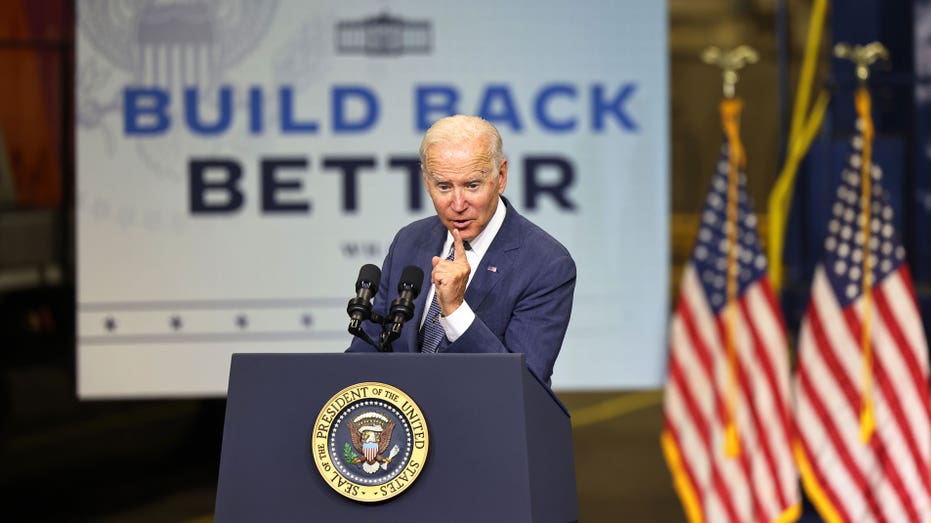Biden's tax plan would push top individual income rate to highest among developed countries
Biden's plan hinges on millionaire surtax, closed Medicare loophole
Grover Norquist on taxes, possible expansion of IRS
Americans for Tax Reform President Grover Norquist on the debt ceiling, taxes, spending and infrastructure negotiations and the possible expansion of the IRS.
The U.S. would have the highest personal income tax rate in the developed world under a White House proposal that would overhaul the nation's tax code in order to fund President Biden's signature spending plan.
The framework that Biden unveiled costs roughly $1.75 trillion ($1,750,000,000,000), which includes funding for universal pre-kindergarten, a one-year expansion of the child tax credit, a modified Medicaid expansion and clean energy tax credits, among other things. It relies on a 15% corporate minimum tax, surtaxes on the top sliver of U.S. households, stricter tax enforcement, taxes on corporate stock buybacks and higher taxes on U.S. companies' foreign earnings.
BIDEN'S REVAMPED TAX PLAN TARGETS MILLIONAIRES, CORPORATE STOCK BUYBACKS
But the Biden team's proposal, which comes after months of negotiations among Democrats, would push the average top tax rate on personal income to 57.4%, the highest rate in the 38-member Organisation for Economic Co-operation and Development, according to a new analysis published by the non-partisan Tax Foundation.

Secretary of State Antony Blinken, left, speaks during a closing session at the Organization for Economic Cooperation and Development's Ministerial Council Meeting, Wednesday, Oct. 6, 2021, in Paris. (AP Photo/Patrick Semansky, Pool / AP Newsroom)
The top sliver of U.S. households would face a 5% surcharge on modified adjusted gross income (MAGI) above $10 million, plus a 3% charge on MAGI above $25 million, for a total increase of 8% – which is equivalent to about a 9.1% tax rate on taxable income, the analysis shows.
The Build Back Better plan would also close provisions in the tax code that allow some wealthy taxpayers to avoid paying the 3.8% Medicare surtax on their earnings by strengthening a net investment income tax for anyone earning more than $400,000.
Under current law, the top marginal tax rate on ordinary income is scheduled to increase from 37% to 39.6% in 2026 when parts of Republicans' 2017 tax law expire. That means the top marginal tax rate on personal income at the federal level would rise as high as 51.4% in 2026, or roughly 52.5% on the basis of taxable income.
"As policymakers explore options to raise revenue, they should keep in mind how the U.S. compares to other countries and what the economic effects might be," the analysis said. "Raising the top marginal tax rate on ordinary income to the highest in the OECD will damage U.S. competitiveness. It will also reduce incentives to work, save, invest, and innovate, with broad implications for the U.S. economy."

U.S. President Joe Biden gives a speech on his Bipartisan Infrastructure Deal and Build Back Better Agenda at the NJ Transit Meadowlands Maintenance Complex on October 25, 2021 in Kearny, New Jersey. (Photo by Michael M. Santiago/Getty Images / Getty Images)
That rate doesn't even factor in state income tax, which is paid by most Americans (just eight states do not tax income). The average top marginal state-local tax rate is about 6%, according to the Tax Foundation, which would mean the combined top tax rate on personal income would be around 57.4%. That's higher than any rate currently levied in a developed nation.
Wealthy taxpayers in New York and California would pay the highest tax rates of 66.2% and 64.7% respectively, while six other states would have top rates above 60%.
GET FOX BUSINESS ON THE GO BY CLICKING HERE
"Even in states that forgo an income tax, such as Florida, taxpayers would have a top rate of 51.4 percent, which far exceeds the top rates found in most OECD countries," the Tax Foundation said.

President-elect Joe Biden gesturing on stage after speaking, Saturday, Nov. 7, 2020, in Wilmington, Del. (AP Photo/Andrew Harnik, Pool)
Japan and Demark are currently tied among OECD nations for the highest top income tax, with a rate of 55.9%. They're followed by France (55.4%), Austria (55%) and Greece (54%).
The U.S. currently has a top combined rate of 42.9%.





















